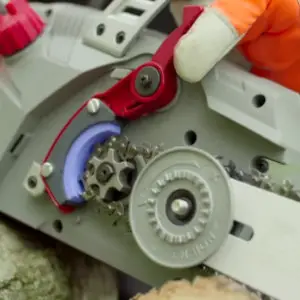Chainsaw chain sharpening can be a tedious and time consuming task. This is where self-sharpening chainsaws come into the picture. But do self-sharpening chainsaws really work? Find out here.
What Is a Self-Sharpening Chainsaw?
A self-sharpening chainsaw is a chainsaw that automatically sharpens the chain as it rotates around the bar. A self-sharpening chainsaw can have either an internally mounted sharpener, or bar mounted sharpener attachment.
Do Self-Sharpening Chainsaws Work?
Yes, self-sharpening chainsaws work well. They can be used to cut small trees, firewood, tree limbs and wood boards. It can make chainsaw jobs go faster because you do not have to stop to sharpen the chain, or have to swap chains out.
However, the exit chute can get clogged with wood debris and require hand removal. Just make sure to turn off the machine and wear safety gloves when you clean it.
How Does a Self-Sharpening Chainsaw Work?
Self-sharpening chainsaws are pretty straightforward in their operation.
A U-shaped or arch-shaped sharpening stone is located around the inside drive sprocket of the chainsaw. As the chain rotates around the drive sprocket at high RPM it comes into contact with the sharpening stone. This stone is set the correct angle to continuously grind a sharp edge on the chain teeth as they pass by.
To keep the chain sharp, the user only has to keep the throttle open, and the chain will get sharp in just seconds as it rotates around the bar. This may require pulling an additional lever to engage the internal sharpening stone, which is shaped like an arch.
Eventually, this sharpening stone will wear down and need replacement. This is straightforward and generally does not require removing the drive sprocket or chain.
Also, self-sharpening chainsaws require bar oil in the reservoir, just like regular chainsaws do.
Make sure that the model you purchase that claims to be self-sharpening actually is, and does not require an external bar attachment (unless that is what you are looking for).
Oregon Products makes the #1 self-sharpening chainsaws on the market. Here are two highly rated ones to check out:
Oregon CS1500 18 inch 15 Amp Self-Sharpening Corded Electric Chainsaw with Extension Cord
Oregon CS300 16-inch Self-Sharpening Cordless Electric Chainsaw with 4.0 Ah Battery and Charger
As an Amazon Associate, SelectSafety earns commissions from qualifying purchases made through links in this post.
Self-Sharpening Chainsaws – Are They Safe?
Yes, self-sharpening chainsaws are as safe, or even safer than regular chainsaws. This is because they do not require chain swapping or hand sharpening which can cause injuries. Also, since the chain is always sharp, there is less chance of kickbacks and binding caused by dull teeth on the chain.
Self-sharpening chainsaws are intended to make chainsawing faster and easier with less fuss. As the name suggests, they are designed to sharpen themselves as they cut. Since a sharp saw is a happy saw, self-sharpening chainsaws are advertised as being safer and easier for loggers and homeowners alike.
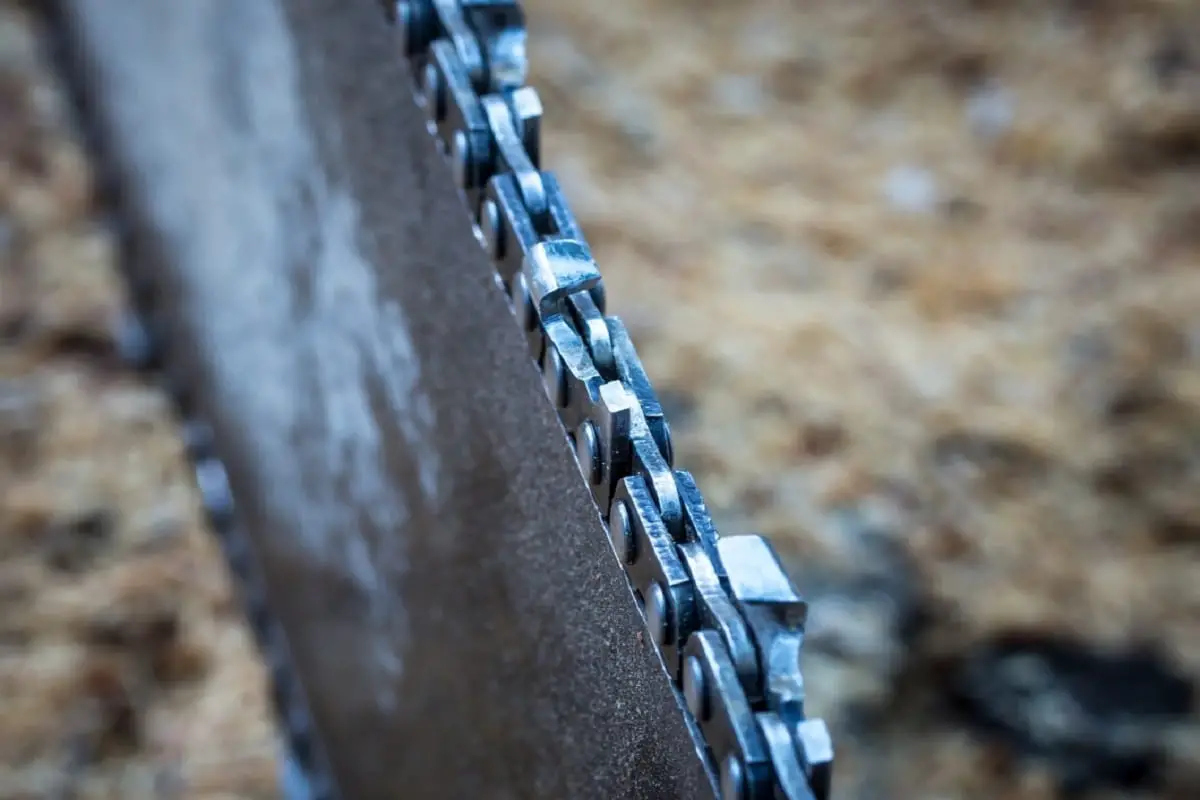
Lifespan of a Self-Sharpening Chainsaw
The lifespan of a self-sharpening chainsaw and and its chain depends on several factors, including: materials it cuts through, frequency of use and angle at which you hold the saw.
Chainsaw sharpening stones are typically guaranteed for 18 months of use, but this again depends on how often the saw is used and how heavy the work is. Self-sharpening chainsaws have a simple sharpening mechanism inside that can wear down or break.
Across most manufacturers we’ve researched, there is little or no difference in the life of a standard chainsaw vs. self-sharpening one, assuming proper maintenance intervals. It really comes down to how hard you use the saw.
Self-sharpening saws remove the hassle and cost of regular chain sharpening. A saw that is always sharp will operate more efficiently with less wear and tear on the motor and bar than a saw whose chain is dull. While it’s difficult to compare chainsaw life due to variations in use and maintenance, you can expect to get very long life with less cost and hassle from a self-sharpening chainsaw vs. a standard chainsaw.
Electric vs. Gas Self-Sharpening Chainsaws
Electric self-sharpening chainsaws made by Oregon come in both corded and battery-powered designs. The cordless models run on lithium ion batteries in various sizes, including 2.6 Ah, 4.0 Ah and 6.0 Ah.
- Oregon CS1500 18 inch 15 Amp Self-Sharpening Corded Electric Chainsaw with Extension Cord
- Oregon CS300 16-inch Self-Sharpening Cordless Electric Chainsaw with 4.0 Ah Battery and Charger
To add self-sharpening capability to a gas chainsaw, you need to use a bar-mounted automatic sharpener such as these high-quality ones (since there are no shelf-sharpening gas chainsaws on the market yet):
- Universal Automatic Bar Mounted Chainsaw Chain Sharpener – fits 1 and 2 holes, 14, 16, 18, 20 inches
- Oregon 16-inch PowerSharp Starter Kit with Bar, Sharpener, and 56 Drive Link PowerSharp Chain
- LRCIPRU Budget Automatic Electric Chainsaw Chain Sharpener – fits 1 or 2 holes, 14, 16, 18, 20 inches
- Allenker Transparent Chainsaw Sharpener – for 2 holes bar, 14, 16, 18, 20 inches
As an Amazon Associate, SelectSafety earns commissions from qualifying purchases made through links in this post.
Alternatives to Self-Sharpening Chainsaws
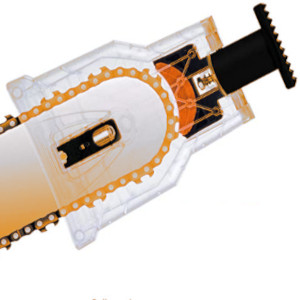
Bar-Mounted Automatic Chain Sharpeners
A sharpener can be attached to the bar of a chainsaw and do the work of sharpening a chain for you automatically, so you can keep your productivity high.
The bar-mounted automatic sharpeners listed above for gas chainsaws will make consistently sharp chains quickly.
While sharpening a chain by hand works well on a single chainsaw outdoors with the right fitting, files and experience, using a bar-mounted chainsaw sharpener is best when you need to sharpen a chain fast in the field.
Automatic Chain Grinders
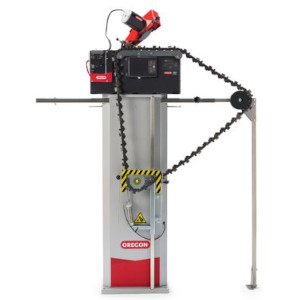
Automatic chain grinders are dedicated machines designed for high volume hands-off chain sharpening. These are used by chainsaw maintenance shops to sharpen chains very quickly with minimal setup. They can be quite expensive from $500-$1000+ dollars each.
Well-known manufacturers of these machines include TEMCo, Oregon Products, DinaSaw and Franzen.
Good automatic chain grinders will automatically shift from left to right cutters to complete the sharpening process in one cycle.
They also do not require manual feeding of the chain, letting you do something else (or nothing at all!) These are set-it and forget-it machines.
Here are some quality automatic chain grinders to check out if you need to sharpen a lot of chainsaws:
- TEMCo FP1000 Automatic Chainsaw Chain Grinder
- Oregon 73-120 Auto Chain Grinder with 3/4″ Pitch
- Franzen SA6 Automated Chain Sharpener Machine
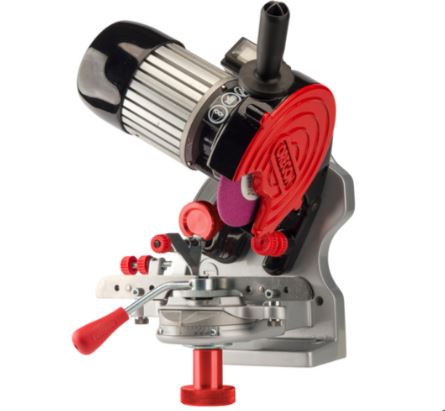
Benchtop Chain Sharpeners
Benchtop chain sharpeners are set up to accurately sharpen chainsaw chains without manually filing. They include a jig and various adjustments so you can sharpen different types of chains accurately. For low-volume work in a repair shop these do a great job for a reasonable cost.
Here are some highly rated benchtop chain sharpeners for precision sharpening:
- Oregon 410-120 120V Bench/Wall Mounted Chainsaw Chain Grinder
- TEMCo FP1000 Automatic Chainsaw Chain Grinder
- Timber Tuff CS-MBCJR Bench Top Chainsaw Chain Sharpener
- Oregon 310-120 Compact 120-Volt Mini Benchtop Chain Sharpener
Bar-Mounted Chain Sharpener Jigs
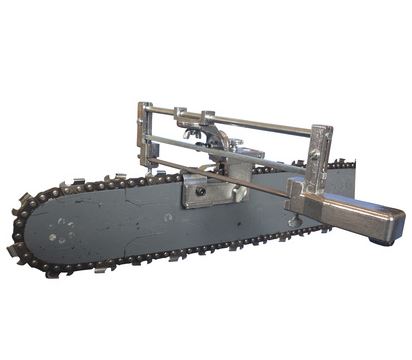
The traditional bar-mounted chainsaw sharpener consists of a jig that clamps to the bar and a file, stone or grinding bit used to sharpen the individual teeth. These tools can be hand-cranked or electric.
This method takes more time to sharpen a chain than automated chain sharpeners. However, it can produce a very sharp chain both cheaply and reliably. Hand crank jigs require no electricity so they’re ideal for sharpening a chainsaw in the field.
A single bar-mounted sharpener can be used with many different makes and models of chainsaw, so it’s very flexible as well.
Here are three good bar-mounted chain sharpener jigs to choose from:
- Granberg G1012XT Precision Bar-Mounted Chainsaw Chain Grinder
- Portable Bar-Mounted Chainsaw Sharpener Jig Kit
- HIKATOP Portable Bar-Mounted Jig Crank Chain Sharpener
Handheld Electric Chainsaw Sharpeners
The final alternative to a self-sharpening chainsaw is a handheld electric chain sharpener / grinder. These are handheld rotary tools with specialized chain sharpening bits with an angle attachment.
The benefits to this method are ease of use and speed. However, it is harder to get a consistent angle on the chain teeth and your grinding skill comes into play.
If you’re just looking to occasionally sharpen a chainsaw you use around the house or ranch occasionally, then a handheld electric sharpener is a good choice.
Here are a few good quality handheld sharpeners for chainsaws to check out:
- Oregon 575214 Sure Sharp Electric Chainsaw Chain Grinder/Sharpener with 16′ Cable
- NEO-TEC Rotary Electric Chainsaw Sharpener Kit
- EzzDoo High Speed Electric Chainsaw Sharpener Kit
Chainsaw Sharpening Stones & Bits
Chainsaw sharpening stones are used to keep chains sharp on self-sharpening chainsaws. Chainsaw sharpening stones are made of emery grain. This material also used for sandblasting because of its ability to remove material from metal surfaces.
Chainsaw sharpening can also be done with burr grinding bits that fit power drills and high speed rotary tools. These often come in packs of 30 in their own cases. They are generally sized:
- Grinding head – 3/16 inch or ~5 mm in diameter, 7/8 inches or 23 mm in length.
- Shank – 1/8 or ~3 mm in diameter.
- Total length of grinding bit – 1 & 6/8 inch or ~50 mm.
Are Automatic Chainsaw Sharpeners Any Good?
Yes, they work very well to sharpen a chainsaw chain when used properly. However, they take a little bit of practice.
The grinding stone will go forward and back on the chain teeth and alternate to cut just enough material from the teeth to make them sharp. Depth, length, and pitch of the grinding stone can be adjusted using front dials or knobs on the machine. Once it is setup, it will run on its own when it is started and automatically sharpen the entire chain.
In Closing
Self-sharpening chainsaws can certainly save time and money for the average chainsaw user by keeping the chain sharp automatically. However, professional chainsaw operators may need something a bit more powerful, such as large gas chainsaws that do not have this feature. So, knowing how to sharpen a chainsaw chain by hand is always a good skill to have if you ever decide to own a chainsaw.

